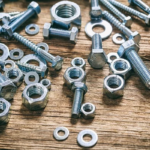When working with stainless steel 304 bolts, it is critical to install them appropriately. This material is known for its corrosion resistance and strength, making it an excellent choice for a variety of applications. However, poor installation can degrade its quality and performance. That is why it is critical to use certain best practices when putting these bolts. This blog post will look at the suggested methods for installing stainless steel 304 bolts.
What is Stainless Steel 304 Bolts?
Stainless Steel 304 is a type of stainless steel made primarily of iron and chromium. It comprises 18% chromium, 8-10.5% nickel, and 0.080-0.20% carbon. This type of stainless steel is nonmagnetic due to its low carbon content. It has excellent corrosion resistance, great machinability, and can be easily welded or formed into various shapes with high tensile strength and wear resistance properties, making it ideal for use in construction projects such as bridge bolts or buildings that require superior strength.
Top Tips for Installing Stainless Steel 304 Bolts: Ensuring Proper Installation and Maximum Performance
Pre-Installation Inspection:
Before you begin your bolting project, you must inspect your bolts for any faults or blemishes. Stainless steel 304 bolts are strong but not indestructible, so keep them free of cracks, burrs, and deformations. It is critical to ensure that they are appropriate for the intended use, taking into account bolt length, thread type, and diameter.
Tightening Techniques:
When putting your stainless steel 304 bolts, do not rush to tighten them. If you overtighten them, they can shatter or snap. On the other side, if you undertighten them, they may not withstand the intended load, resulting in poor performance. To ensure the bolts are properly tightened, use a calibrated torque wrench to determine the recommended torque value.
Lubrication:
During installation, make sure to lubricate the threads to prevent galling, which is a common problem with stainless steel bolts. Galling occurs when there is too much contact between the bolt and nut surface, causing the threads to seize up. Lubrication lowers friction on the threads, lowering the risk of galling and making the tightening process easier.
Storage and Handling:
Stainless steel 304 bolts are prone to corrosion and may rust when exposed to moisture or other corrosive substances. So, keep your bolts in a clean, dry place. Furthermore, using clean hands will keep oil or dirt residue from contaminating the bolts’ surface, resulting in corrosion.
Inspection and Maintenance:
After installation, verify your bolts on a regular basis to ensure they are secure and undamaged. Look for evidence of corrosion, cracks, or wear and tear. Additionally, you should undertake periodic maintenance, lubricating the bolts and using anti-seize as needed.
Uses of Stainless Steel 304 Bolts
Stainless Steel 304 Bolts are employed in a variety of applications due to their strength and corrosion resistance. They are commonly used in plumbing systems to make leak-proof connections, in high-strength joints such as bridges, and as fastening for machinery and furniture. They can also be utilized in tough chemical settings such as oil refineries due to their high resistance to corrosives such as acids, alkalis, and chlorine compounds. Furthermore, the FDA and NSF/ANSI standards have certified SS304 bolts as food-safe. As a result, they are appropriate for use with tanks containing water or other beverages that may be contaminated.
Conclusion:
Installing stainless steel 304 bolts can be difficult, but following best practices is critical to ensuring they work as expected. Remember to perform pre-installation checks, use calibrated torque wrenches, lubricate the bolts, and keep them in a clean, dry environment. Finally, inspect and repair your bolts on a regular basis to ensure their long-term performance and longevity.




